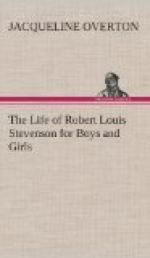“Opposite the study was the parlor, a small room crammed full of furniture and covered with portraits, with a cabinet at the side full of foreign curiosities, and a sort of anatomical trophy on the top. During a grand cleaning of the apartment I remember all the furniture was ranged on a circular grass plot between the churchyard and the house. It was a lovely still summer evening, and I stayed out, climbing among the chairs and sofas. Falling on a large bone or skull, I asked what it was. Part of an albatross, auntie told me. ‘What is an albatross?’ I asked, and then she described to me this great bird nearly as big as a house, that you saw out miles away from any land, sleeping above the vast and desolate ocean. She told me that the Ancient Mariner was all about one; and quoted with great verve (she had a duster in her hand, I recollect)—
’With my crossbow
I shot the albatross.’
... Willie had a crossbow, but up to this date I had never envied him its possession. After this, however, it became one of the objects of my life.”
With many playmates, free to roam and romp as he chose, his illness forgotten, it is no wonder he says he felt as if he led two lives, one belonging to Edinburgh and one to the country, and that Colinton ever remained an enchanted spot to which it was always hard to say good-by.
CHAPTER III
THE LANTERN BEARER
“Perhaps there lives some dreamy boy, untaught
In school, some graduate of the field or street,
Who shall become a master of the art,
An admiral sailing the high seas of thought,
Fearless and first, and steering with his fleet
For lands not yet laid down on any chart.”
—Longfellow.
School days began for Louis in 1859, but were continually interrupted by illness, travel, and change of school. His father did not believe in forcing him to study; so he roamed through school according to his own sweet will, attending classes where he cared to, interesting himself in the subjects that appealed to him—Latin, French, and mathematics—neglecting the others and bringing home no prizes, to Cummie’s distress.
Certain books were his prime favorites at this time. “Robinson Crusoe,” he says, “and some of the books of Mayne Reid and a book called Paul Blake—Swiss Family Robinson also. At these I played, conjured up their scenes and delighted to hear them rehearsed to seventy times seven.
“My father’s library was a spot of some austerity; the proceedings of learned societies, cyclopaedias, physical science and above all, optics held the chief place upon the shelves, and it was only in holes and corners that anything legible existed as if by accident. Parents’ Assistant, Rob Roy, Waverley and Guy Mannering, Pilgrim’s Progress, Voyages of Capt. Woods Rogers, Ainsworth’s Tower of London and four old volumes of Punch—these were among the chief exceptions.




